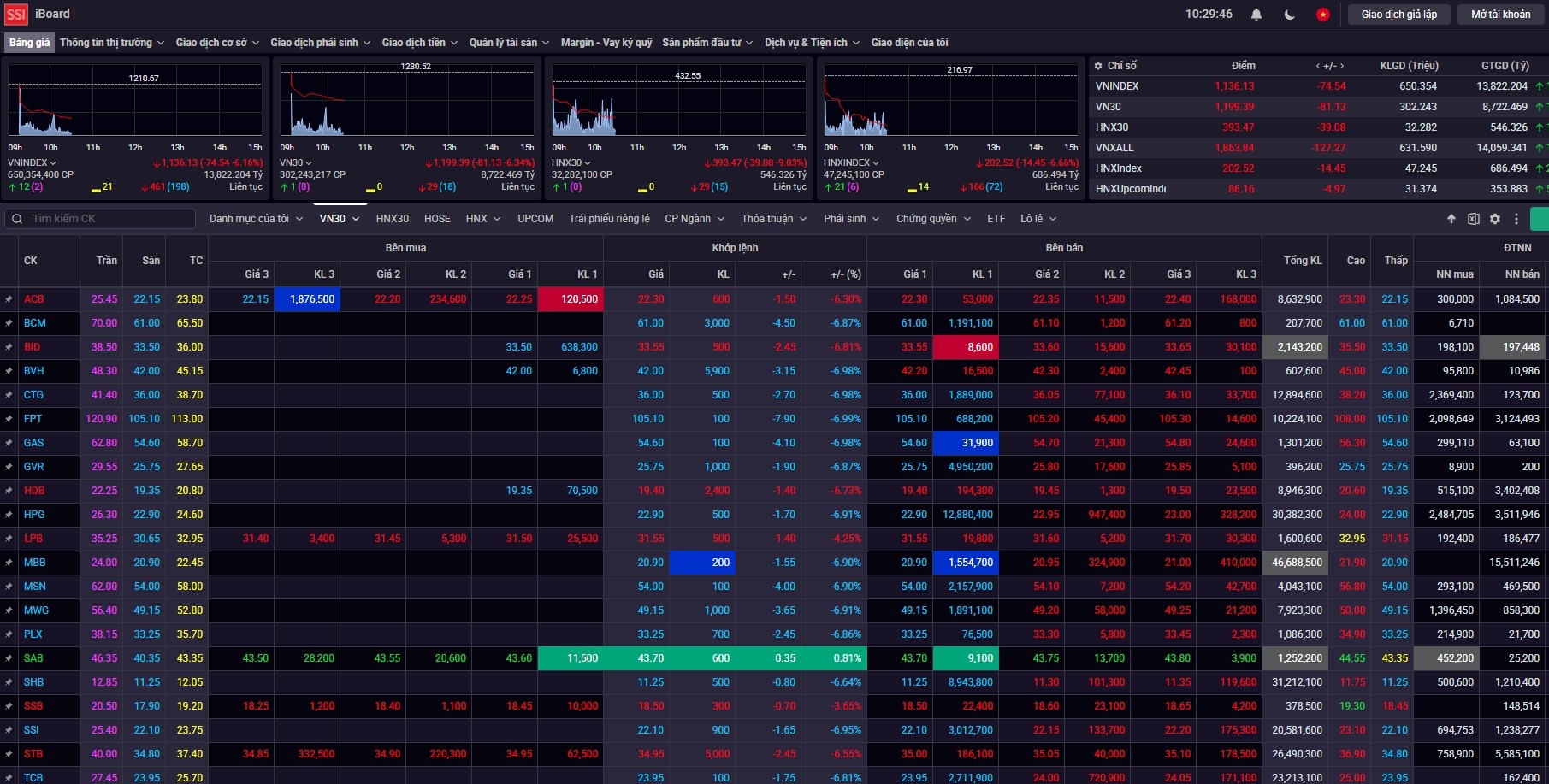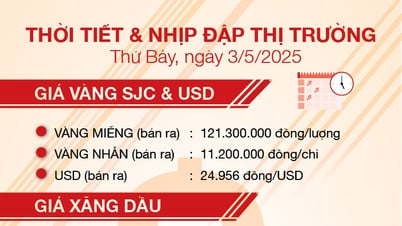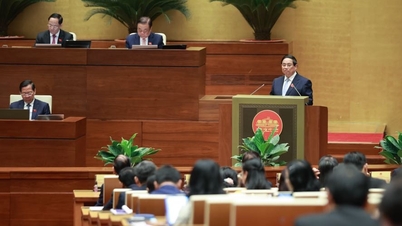Selling pressure floods the market, investors panic
The morning trading session on April 8 witnessed a haunting scene when the electronic board was covered in blue with 268 stocks hitting the floor. The total number of stocks that decreased in price was up to more than 500, while only 60 stocks increased in price. This number reflects the pessimistic sentiment spreading among the investor community.
Market liquidity also dropped significantly, reaching only about VND18,000 billion, much lower than the level of more than VND25,000 billion recorded at the same time last weekend. This sign shows that market confidence has clearly declined, and demand for disbursement at low prices is no longer as strong as in the last two trading sessions.
"This is a shock to many individual investors. In just a few days, the value of the portfolio has dropped significantly," Nguyen Van Anh, an investor in Phu My city, told reporters.
 |
| Red continues to cover the stock market on the morning of April 8. |
The performance of the Vietnamese stock market is not an isolated case in the regional picture. While the VN-Index was closed yesterday, April 7, due to a holiday, a series of stock markets in the region simultaneously fell sharply.
In Taiwan, the situation was so severe that a circuit breaker was triggered when the index fell 9.7%, approaching the regulatory threshold of 10%. Similarly, the Tokyo Stock Exchange halted trading for 10 minutes after Nikkei 225 futures fell beyond 8%.
According to experts, the circuit breaker mechanism is designed to temporarily halt trading in case of extreme volatility, a measure applied by many markets around the world but rarely used.
Vietnam has not yet applied the circuit breaker mechanism.
Faced with an unprecedented sell-off, many Vietnamese investors have questioned the possibility of applying the circuit breaker mechanism in the domestic stock market, an effective tool to help stabilize market sentiment during extreme fluctuations.
According to a leader of the Ho Chi Minh City Stock Exchange (HoSE), this issue has been mentioned before: "However, our trading amplitude is not high, at 7%. Therefore, there is no need for an automatic circuit breaker mechanism like many other markets."
The leader also revealed that in the future, the new information technology system (KRX) will integrate an automatic circuit breaker mechanism, but it can only be used when the reduction margin is widened to a higher level.
Stock market experts say that most other markets, including developed markets and many emerging markets, have applied the circuit breaker mechanism. Bringing this mechanism into the Vietnamese market is considered in line with international practice, but the current old system cannot integrate this feature.
Despite the generally negative reaction, there are still investors who see this as an opportunity. Ms. Tran Thi Bac, an investor in Vung Tau city, said: "I think the market is overreacting. The Vietnamese economy still has solid fundamentals, and I believe the government will have support measures."
Similarly, Mr. Pham Van Cuong, a veteran investor in Ba Ria city, expressed optimism: "Vietnam has faced many difficulties in the past and always overcome them. I believe businesses will find ways to adapt to overcome this challenge."
Financial experts say Vietnam still has the opportunity to minimize the impact through a strategy of diversifying its export markets. Although the US is an important market, Vietnam has signed many free trade agreements such as CPTPP and EVFTA, creating conditions to boost exploitation of EU and ASEAN markets. This is a difficult time but also an opportunity for Vietnamese enterprises to re-evaluate their business strategies, diversify their markets and reduce their dependence on a single market.
In addition, the government can consider supporting policies such as tax breaks or subsidies for heavily affected businesses. A notable bright spot is that in 2025, Vietnam is expected to be considered for upgrading to emerging market status, an important step that could attract foreign capital if it overcomes the current crisis.
Market operators and regulators are closely monitoring developments and are ready to intervene if necessary to ensure the stability of the Vietnamese stock market during this volatile period.
Article and photos: NGUYEN NAM
Source: https://baobariavungtau.com.vn/kinh-te/202504/thi-truong-chung-khoan-viet-nam-tiep-tuc-chao-dao-1039119/


![[Photo] Vietnam and Sri Lanka sign cooperation agreements in many important fields](https://vphoto.vietnam.vn/thumb/1200x675/vietnam/resource/IMAGE/2025/5/5/9d5c9d2cb45e413c91a4b4067947b8c8)





















![[Photo] President Luong Cuong and Sri Lankan President Anura Kumara Dissanayaka visit President Ho Chi Minh relic site](https://vphoto.vietnam.vn/thumb/1200x675/vietnam/resource/IMAGE/2025/5/5/0ff75a6ffec545cf8f9538e2c1f7f87a)


































![[Photo] President Luong Cuong presided over the welcoming ceremony and held talks with Sri Lankan President Anura Kumara Dissanayaka](https://vphoto.vietnam.vn/thumb/402x226/vietnam/resource/IMAGE/2025/5/5/351b51d72a67458dbd73485caefb7dfb)






























Comment (0)